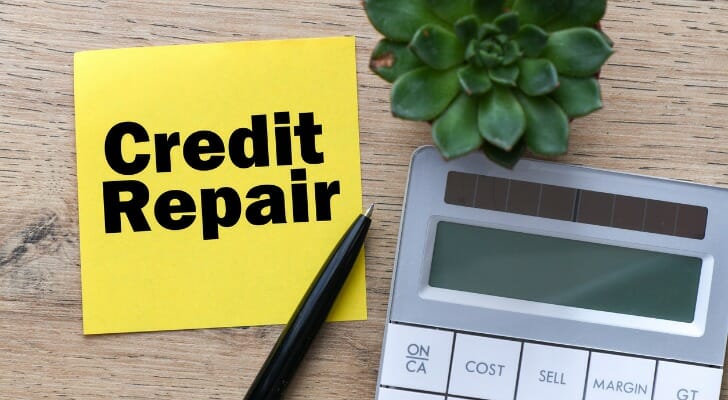Your credit score is a numerical representation of how responsible you are with your finances and, by extension, how trustworthy you are as a borrower. So if your credit score has fallen, whether through your own negligence, a mistake in reporting or a case of stolen identity, it’s essential for you to repair your credit score as soon as possible. That can help ensure you will be eligible for mortgages and loans and lines of credit at the best rates. Repairing your credit score relies on a systematic process of identifying the problematic areas of your credit report and taking pains to report errors or demonstrate consistently responsible behavior to curry favor from credit reporting agencies.
Whether you’re paying down debt or saving for your next investment, a financial advisor can help you create a financial plan to reach your goals.
Get Your Report
First things first, look under the hood of your credit report. You can access your credit report for free once per year through the website Annual Credit Report. The federal government requires the three reporting agencies, Experian, TransUnion and Equifax, to run this website for all consumers. You can also get this information by calling 877-322-8228.
This is the most important first step to fixing your credit because it will tell you what is pulling your credit down. As a general rule you want a credit score above 700 in order to qualify for most loans, leases and credit options.
Your credit report should show not just all outstanding loans in your name, but all events of any kind which are affecting your credit. This can include unpaid bills, personal information, percentage of used credit and even simple credit inquiries. (Yes, having someone check your credit can reduce your score, even if you don’t take out the loan.) These events can affect your credit for up to seven years, so there’s a good chance this report will include things you don’t even remember.
Check for and Dispute Errors

Read your credit report thoroughly and make sure that all of the information it contains is accurate. The reality is that the credit reporting agencies often make mistakes. According to the Consumer Financial Protection Bureau roughly one in five consumers has an error on their credit report which may be dragging their score down. Because the law makes it your job to find and report these errors (on a credit report to which you are only given free access once per year) the reporting agencies do little to police for accuracy themselves.
Look for mistakes such as:
- Incorrect personal information
- Accounts or loans you did not open
- Accounts listed as open that you have closed
- Bills listed as unpaid that you have paid or otherwise resolved
- Accounts incorrectly listed as late or delinquent
- Balance errors
- Debts or accounts listed multiple times
If you find a mistake, dispute it. Gather the paperwork necessary to prove your claim (for example, a canceled check from a bill that you paid). Then write to each credit reporting agency with this dispute and a copy of any paperwork you have. Never, ever send the originals.
The CFPB has more information on disputing inaccurate reports on its website, as does the Federal Trade Commission.
Address Unpaid, Delinquent and Defaulted Accounts
Once you have corrected any mistakes on your credit report, your next steps are financial.
Ultimately, there are four common ways to build good credit and repair bad:
- Pay your bills on time and in full
- Have no delinquent or defaulted lines of credit
- Use a small portion of your total credit at any given time
- Limit your applications for new credit
If you have bad credit and there are no errors on your report, the odds are very good that you have multiple items on your credit report listed as late, delinquent or defaulted.
It’s important to understand that even a small late payment can have a large impact on your credit history. This is not an industry built to protect the consumer. As a result it embraces many counter-intuitive and often hostile practices. For example, making timely payments on a utility bill does not build credit or help boost your credit score. However missing a payment by even one billing cycle can drag down your score by as much as 30 points in a single month.
As a result, your next step is to scan your credit report for any bills listed as late or otherwise outstanding.
To the extent financially possible, bring all of these accounts current. Pay anything listed as late or unpaid. Set your regular bills (such as utilities, credit cards and loan payments) to auto-payments to ensure that they register as on time going forward. If necessary set the auto-payment to the account’s minimum monthly payment. That’s fine from a credit standpoint, as it will register the account as paid on time every month.
Overall what you are trying to do here is catch up all of your accounts to “current” status. On time payments are the most important part of a credit score, and late payments will erode your score much faster than most consumers realize. It is important to fix that.
Beware of Scams
The credit industry is built on the premise that, if you are in contact with it, you can be exploited. People with bad credit often struggle with money problems and are frequently desperate. This makes them highly vulnerable to predatory behavior.
Consumers complain about exploitative, manipulative and deceptive tactics in this industry. Companies and law firms will promise to fix your credit overnight, charging high fees and delivering little in return. The credit rating agencies will try to charge you for access to information you are entitled to by law. Even websites offering legitimate information will bury those links below the fee-based services and other gimmicks.
Be careful. Be deliberate. Do not pay for anything unless you have researched it thoroughly. And if someone is promising you an overnight fix, approach their offer with the same common sense that you would in any other aspect of life.
Know Your Rights
Your first stop should be the Federal Trade Commission’s article explaining your rights in this industry. MyFICO also has an excellent summary on their website.
The best way to safeguard yourself against predatory behavior is to understand your rights and responsibilities under laws such as the Fair Credit Reporting Act. If someone tries to charge you for access to your credit report, for example, this is a sign that they are acting in bad faith. Although it is both legal and common for companies to charge you when they pull your credit report for their own access, you are entitled to know your own credit. If they deny you information about why they placed a negative item on your report, or refuse to back up that action with paperwork, this too can be a bad sign.
The best way to know these red flags is to read up on your rights ahead of time.
Don’t Cancel Cards or Apply for New Ones
One of the ironies to a credit score is that it is helped by having open lines of credit, but hurt by creating those lines of credit.
Every time you apply for new credit, whether it’s a loan or a credit card, your score decreases. As a result it is important to not apply for any new lines of credit until your score is reliably, sustainably back where you want it to be.
However, at the same time, an important thing to know about protecting your credit score is your percentage of unused credit. For most people “available credit” is defined by the combined upper limits on all of their credit cards. “Used available credit” is defined by how much you owe on your total available credit.
Say, for example, you have a $10,000 upper limit on your credit card. If you owe $4,000 on that card, you are using 40% of your available credit. This will affect your score less than if you owe $8,000 on that card, which will use 80% of available credit.
Pay down your credit cards as much as possible but don’t cancel them. Nor should you apply for new ones. Some articles recommend that you open new lines of credit in order to increase available credit, thereby lowering the percent of used available credit. Do not do this. It can often backfire, with the process of getting a new credit card hurting your score more than the new card helps it.
Your goal is simply to use as little of your available credit as possible.
Manage Debt, Seek Counsel

If you have credit problems there is a good chance that at least part of the issue has to do with debts that you cannot fully pay. This is common. Many people fall behind on loans and have difficulty catching up. For many loans, such as mortgages, student debt or some credit cards, late payments can trigger a default which makes the entire note due at once. This creates an almost impossible situation where, because you could not make the monthly payments, you are now responsible for paying the loan in one lump sum.
Your next steps, then, are to begin managing this debt. As suggested above, if at all possible start by setting all of your bills to an automatic, minimum monthly payment. This won’t necessarily get you out of the hole, but it will stop things from getting worse.
Next take stock of your finances and begin figuring out which debts you can begin to pay off first. Concentrate on your high-interest loans, which for most people will typically be credit cards. Seek out debt management solutions such as the income-based repayment options on most student loans. And work hard to make a budget that is sustainable while you go through this process.
While a full primer on debt payment is beyond the scope of this article, you can find thoughtful guides and discussion on the subject at our debt landing page here.
But you don’t have to do this alone.
Most people find financial management a difficult task. Don’t be afraid to reach out to an advisor. It may seem odd to spend money at a time when you are trying to save and consolidate your expenses, but a sound financial professional can explain your options and obligations. This is a difficult field to navigate, and many financial management strategies such as debt consolidation and refinancing can take years of experience to understand fully.
If you find yourself faced with debt that seems truly difficult to pay, a financial advisor may be able to help. In fact they often can.
Bottom Line
Fixing bad credit takes time, but it can be done. From challenging errors on your report to ensuring rigorous on-time payments, this is a difficult project that is well worthwhile.
Tips for Handling Your Credit Score
- Consider talking to a financial advisor about protecting your credit score. SmartAsset’s free tool matches you with up to three vetted financial advisors who serve your area, and you can interview your advisor matches at no cost to decide which one is right for you. If you’re ready to find an advisor who can help you achieve your financial goals, get started now.
- Everyone wants their credit score to be as high as possible. You can also use credit cards to aid your score while earning valuable rewards. If you’re looking for your next credit card, consider using SmartAsset’s guide to 2020’s best credit cards.
Photo credit: ©iStock.com/domoyega, ©iStock.com/roobcio, ©iStock.com/sutlafk
